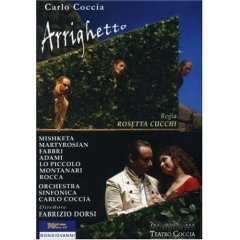|
Coccia - Arrighetto
Corrado – Gezim Mishketa
Despina – Elisaveta Martyrosian
Rosa – Enrica Fabri
Gianotto – Filippo Adami
Tebaldo – Maurizio Lo Piccolo
Conte Ludovico – Omar Montanari
Pasquale – Davide Rocca
Conductor – Fabrizio Dorsi
Director – Rosetta Cucchi
Designer – Ursula Patzak
Lighting – Jean Paul Carradori
Recorded at Teatro Coccia di Novara, November 2005
Bongiovanni – AB 20004 1 DVD – 85 minutes
Rossini was a genius; his compatriot and contemporary Carlo Coccia was not, and well knew it. However, he was a very fine craftsman, who could turn out enjoyable pieces, with a more homespun feeling, ideally suited to performance in smaller theatres.
Arrighetto is just such an opera. Described as a “farsa sentimentale” in one act, its story of two sons exiled from their father as children and subsequently separated, and meeting up when they both fall in love with same girl, unfolds gently but persuasively. Despina’s serious and well-meaning father and over-ambitious stepmother swell out the cast, and the elderly gardener turns out to be the brothers’ long lost hero-father, just about to be re-elected to office.
There may no “great” tunes, but the score is constructed with considerable skill, especially the vocal ensembles which are remarkably well fitted to both text and characters, and there are some very pleasing solo arias. Nothing is either skimped or over-blown, it all fits perfectly into its one-act format.
This is a production that does the piece full justice. Rosetta Cucchi’s direction (unusually she has a “music staff” background, and her name is well known as a repetiteur and accompanist at both Pesaro and Wexford Festivals) makes a virtue of simplicity, letting the music lead the action. Un-sophisticated scenery panels, which are moved around by two engaging Pages (Asia d’Arcangelo & Fabio Vichi), represent interior walls on one side and clipped hedges on the other, and provide ample hiding places in the garden.
The Orchestra Sinfonica Carlo Coccia plays with controlled cheerfulness, and the cast sing and act with considerable style. Despina (Elisaveta Martyrosan) gets the most taxing arias, which she negotiates adroitly. It all adds up to a performance of considerable charm, and on a scale which is particularly well suited to the TV screen. A palpable “hit”.
Serena Fenwick
PS Coccia ended his long career in London as a professor of harmony and singing at the Royal Academy of Music, making this an opera that should perhaps be on the “short list” for the college students to perform.SF
|

